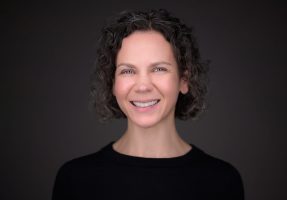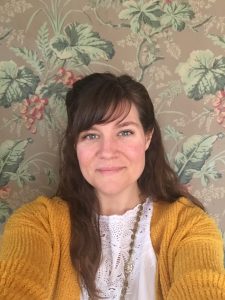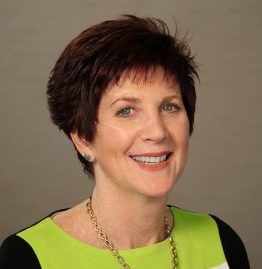2023 LCA Family Conference: Advocating for Treatments
Here’s what you need to know about advocating for advanced treatments for Leber congenital amaurosis: Get genetically tested, get legislatively connected, and get enrolled in a patient registry.
The Hope in Focus 2023 LCA Family Conference* panel on Advocating for Treatments repeatedly returned to this action trio to move treatments forward for this rare inherited retinal disease (IRD) affecting about 8,000 people in the United States and 160,000 worldwide.

Jonathan Stokes
Jonathan Stokes, Senior Director of Patient-Centered Outcomes Research with the biopharmaceutical company AbbVie, moderated the five-member panel at the June 23-24, 2023, LCA family-centered conference in Indianapolis. This session marked the first of four for more than 100 people gathered at the conference.
Genetic Testing is Critical
Emily Place, Senior Genetic Counselor and Manager of Genetics and Genetic Counseling at Massachusetts Eye and Ear, said the first place to start is to get genetically tested, a process becoming easier with time. An open-access genetic testing program managed by the Foundation Fighting Blindness creates a smoother journey to finding the specific gene causing a mutation resulting in LCA or other IRDs.
Your new confirmed genetic diagnosis opens the door to advocacy groups and researchers working to develop treatments and cures for blindness.
The National Society of Genetic Counselors (NSGC) offers in-depth genetic testing information, including a search tool to help find a certified genetic counselor in your area.

Emily Place
Emily said listening to the voice of the patient is the way to move research forward. And, in the rare inherited retinal disease world, that begins with genetic testing and genetic counseling.
A genetic test provides one of three results: Positive, negative, or inconclusive.
A positive result means the test found mutations in a specific gene that can identify the cause of vision impairment.
A negative result means the test could not identify a specific genetic cause for the disease, but it does not rule out a retinal disease diagnosis.
An inconclusive result means the test didn’t find helpful information about the gene in question. Because it can be difficult to distinguish between a disease-causing gene and a harmless gene variation, follow-up testing or periodic review of the gene over time might be necessary.
Emily said it’s important to stay connected with your genetic counselor for support along the way, especially with an inclusive result. As the knowledge base of genetic data grows, future tests could garner more definitive results.
Genetic testing information can be found at Hope in Focus, which has contributed more than $200,000 to help support the Foundation’s free access to genetic testing.
You’ll find information on the Foundation’s website under the Genetic Testing section, where you can download their detailed resource booklet, “Genetic Testing for Retinal Degenerative diseases: Information and Resources for Affected Individuals, Families and Health Care Providers.”
Empower U.S. Senators and Representatives to Advocate for LCA
Our panelist from the U.S. Food and Drug Administration agreed with importance of genetic testing. Wiley A. Chambers, MD, Supervisory Medical Officers of the Office of New Drugs for FDA’s Center for Drug Evaluation and Research, also advised bringing information to Congress for action. He and his eight-member team have signed off on 200 approvals of new drugs.

Wiley Chambers
“The best place you can make an important impact is to talk with your representatives and senators,” Dr. Chambers said.
A good place to start is with their staff of congressional aides, who can synthesize and relay relevant information to lawmakers.
He noted a key change at the FDA in the 1960s that informs the current drug approval process.
In October 1962, Congress passed the Kefauver-Harris Drug Amendments to the Federal Food, Drug & Cosmetic Act, which contains regulatory requirements defining the FDA’s level of control over these products. Before marketing a drug, firms still had to prove safety; now they also need to provide substantial evidence of effectiveness for the product’s intended use. This requires adequate and well-controlled studies, and, before marketing, the FDA needs to specifically approve a marketing application, according to the FDA.
Dr. Chambers emphasized that any clinical trial needs to show what the product is going to do to benefit a particular individual. He cited one of the endpoints or outcomes – early in Spark Therapeutics‘ gene therapy trial – that enlarged the size of the pupil.
“So what?” he said. “That’s not an endpoint that is meaningful to any individual.”

Jacose Bell
An endpoint of value would improve vision, slow, or stop vision loss, and help with daily activities.
Panelist Jacose Bell, Senior Patient Advocacy Lead at Spark Therapeutics, said the clinical trial at issue needed light as a factor as an endpoint.
Spark redesigned its trial to include a relevant endpoint instrumental in demonstrating how voretigene neparvovec could improve vision in LCA2 RPE65 patients, leading to the approval of LUXTURNA®. The endpoint – a multi-luminance mobility test (MLMT) – measured functional vision or how a person navigates in a vision-related activity across a range of light levels in daily living.
Engage state lawmakers to advocate for LCA advances
Reaching out to congressional aides is important, and even before taking that action, people can inform and raise awareness of the needs of the LCA and IRD community on local and state levels. This means calling, writing, or emailing your governor and state representatives and senators. It means acting and being participatory.
The National Organization for Rare Disorders (NORD) runs a state-by-state Rare Action Network that works to establish Rare Disease Advisory Boards or RDACs. Connecticut, headquarters for Hope in Focus, recently became the 24th state establishing a council specifically to address the complexities of living with a rare disease (including LCA and other IRDs), caring for someone with a rare disease, gaining access to treatment, and getting better insurance coverage.
The RDAC gives patients, families, caregivers, healthcare providers, advocates, researchers, and other stakeholders the opportunity to make formal recommendations to state agencies and the legislature to improve the lives of people living with rare disease and their caregivers.
Click here to find out if your state has an RDAC or is developing one and you would like to help make it a reality.
Lighthouse Guild also provides medical assistance and social support to people who are blind or visually impaired so they can fulfill their goals and live with independence.
EveryLife is another resource providing help for people living with rare diseases, including LCA and other IRDs.

Laura Manfre
Results of surveys filled out by people living with LCA and other IRDs also help define areas in need of advocacy, resources, and research.
LCA and IRD Patient Registry – My Retina Tracker®
Panel member Laura Manfre, Board Chair and Co-Founder of Hope in Focus, centered on patient registries as a driving factor in advancing treatment.
“MRT, MRT, MRT,” she said as a mantra to the group. MRT – My Retina Tracker® – is an online, confidential registry of people with rare retinal degeneration, including those with LCA or other IRDs.
Foundation Fighting Blindness launched and manages the registry with the purpose of enabling people with inherited retinal degenerative disease, their doctors, and researchers to actively collaborate in the research process.
To optimize the power of MRT, registrants should seek a genetic diagnosis, which the registry facilitates by making registrants eligible for free genetic testing.
Patients share information about the history, progression, and personal impact of their disease, they authorize their doctors to add their diagnosis and clinical information to their profile, and they take part in research studies when identified and contacted through MRT by researchers as potentially good subject for their studies.
The larger and more detailed the registry, the more beneficial the data becomes to doctors and scientists in helping advance research.
Another specific way to bring research to the labs and new treatments to market is through patient advisory councils established by biotechnology companies.

Jill Dolgin
Panelist Jill Dolgin, PharmD, Executive Director of Global Patient Advocacy & Scientific Management for Beacon Therapeutics, said she even brings people into the lab to explain in plain language the complexities of clinical trials. This brings a broader understanding and familiarity to people who potentially might participate in trial research, including natural history studies of patients.
“You’re the experts,” Jill told her audience. “We’re not.”
Natural history studies identify demographic, genetic, environmental, and other factors shaping the drug development process. They give scientists and researchers a better estimate of the prevalence of the disease, help identify potential biomarkers, affect clinical outcome assessments, and determine the feasibility of established assessments for clinical trials.
Finding people to take part in research into a rare disease is inherently difficult, so reaching out to patients and helping them learn about the process helps expand the pool of potential participants.
Dr. Chambers says he hears about the difficulties of natural history studies from both sides, with researchers saying they can’t find patients to take part in the study, and patients saying they can’t find the study in which to participate.
“The starting point for each of these is genetic testing,” he said.
***
Hope in Focus would like to thank this session’s moderator, Jonathan Stokes, and its panelists, Emily Place, Dr. Wiley A. Chambers, Jill Dolgin, and Jacose Bell.
We are also grateful for the support of our sponsors in helping bring to fruition a gathering of such importance and relevance to the LCA and IRD community. Thank you, Spark Therapeutics, Foundation Fighting Blindness, MeiraGTx, Janssen, Atsena Therapeutics, Ocugen, and Kiora Pharmaceuticals.
*Please see our Hope in Focus website for three more stories detailing sessions from our 2023 LCA Family Conference. Click here to see a video about the conference.
